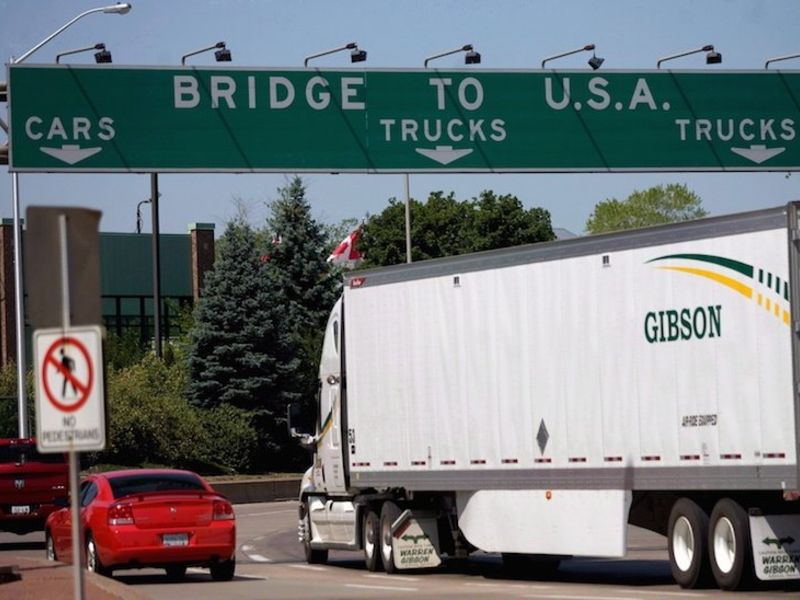
WASHINGTON — Fully vaccinated U.S. citizens and permanent residents will be allowed into Canada as of Aug. 9, joined by the rest of the world Sept. 7, federal officials announced Monday — much to the delight of some in the Canadian auto industry — as the country prepares to lower border barriers that were erected to limit the spread of COVID-19.
Officials say the 14-day quarantine requirement will be waived beginning the second week of August for eligible travelers who are currently residing in the United States and have received a full course of a COVID-19 vaccine approved for use in Canada.
“We’re excited to see this as news. This will help certainly ease some of the tension that’s been realized by the companies doing cross-border business,” Jeanine Lassaline-Berglund, president of the Canadian Association of Moldmakers (CAMM) and Automate Canada, which advocates for Canadian manufacturers, told Automotive News Canada moments after the announcement.
Despite decades of building an integrated North American supply chain, the inability to move essential personnel across the border over the past year has cost millions of dollars and is likely to cost even more, Lassaline-Berglund said earlier this month.
“There has been an erosion of customer confidence, particularly U.S. customers,” she said in the July 19 print edition of Automotive News Canada.
Shortly before the federal government announced the first-stage gradual reopening of the border, which began July 5, CAMM released a survey of member companies in conjunction with the Canadian Tooling & Machining Association, Automate Canada and the Niagara Industrial Association.
Eighty-seven percent of 91 employers surveyed reported quarantine orders for employees and visitors, and denial of entry by visitors into Canada.
Sixty-nine percent said they had lost contracts because of these border problems.
Jonathon Azzopardi, president of Windsor, Ont.-based Laval International, said he has lost some longtime customers.
“I’ve had clients who I’ve had relationships with for 25 years, and I haven’t been able to provide the services that I would normally provide to them — technicians, face-to-face interactions, their ability to come and sign off on the product — so they’ve had to go elsewhere.”
Losing that position as a preferred source could mean never getting those opportunities again, he said.
Lassaline-Berglund on Monday said CAMM “still didn’t get any further definition on what’s considered essential work,” something the association has spent months advocating for in order to allow even more workers in the auto industry to cross more freely.
“Hopefully this announcement will lead to further confidence in allowing that to happen,” she said.
Canadian border officials are responsible for determining admissibility to the country and whether any exemptions apply, said Anne Génier, a spokeswoman for Health Canada and the Public Health Agency of Canada.
An exemption allows technicians or specialists to enter Canada to maintain, install or inspect equipment necessary to support critical infrastructure, Génier said. That includes energy and utilities, information and communication technologies, finance, health, food, water, transportation, safety, government and manufacturing.
Those technicians and specialists are not exempt from pre-arrival testing, unless they are regular cross-border workers, she said.
Monday’s move comes two weeks after the Canada Border Services Agency began waiving quarantine rules for fully vaccinated Canadian citizens and permanent residents. It remained unclear Monday if or when the Biden administration plans to reciprocate for visitors to the U.S.
“This preliminary step allows for the government of Canada to fully operationalize the adjusted border measures ahead of Sept. 7, 2021, and recognizes the many close ties between Canadians and Americans,” the government said in a news release.
Children under 12 who are accompanied by fully vaccinated and eligible family members will also be exempt from quarantine, provided they wear a mask in public places and avoid indoor group settings.
All travelers will still be required to submit a negative COVID-19 test result and proof of vaccination prior to arrival by way of the ArriveCAN smartphone app or web portal, but post-travel test results will no longer be necessary.
Canada Border Services Agency officials will also be subjecting random travelers to a mandatory molecular test upon arrival.
“This strategy allows the government of Canada to continue monitoring variants of concern in Canada and vaccine effectiveness,” the release said.
“Using these layers of protection, the government of Canada can monitor the COVID-19 situation in Canada, respond quickly to threats and guide decisions on restricting international travel.”
As of Aug. 9, airports in Halifax, Quebec City, Ottawa, Winnipeg and Edmonton will also be added to the list of Canadian cities where international flights are permitted to land. Air travelers will no longer be required to spend the first three nights of their quarantine at a government-approved hotel.
“However, all travelers must still provide a quarantine plan and be prepared to quarantine, in case it is determined at the border that they do not meet the necessary requirements.”
With files from the Canadian Press, and Greg Layson and Dene Moore of Automotive News Canada.

